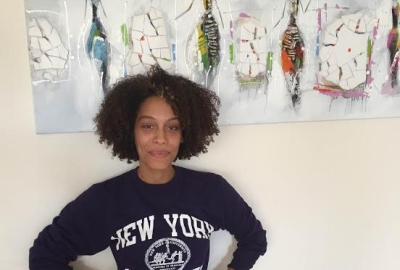
What was your research focus?
The themes that ran through my research at NYU heavily focused on identity formation, school integration, college access and support, social and cultural capital, all within the scope of higher education. Achieving educational equity framed the lens through which I understood and wrote about many of these concepts.
Much of my coursework focused on the experiences of Black and Latino students at competitive, elite colleges and universities.
What was your thesis question and a few sentences about it?
I explored how students navigate spaces that are staunchly divided across class and racial lines. If colleges serve as spaces for social mobility, it is important to understand how individuals from diverse backgrounds engage with and become part of these culturally rich communities. I take a, further, look at the juxtaposition experienced by underprivileged students who attend privileged spaces of higher education, as they ironically become part of these elite communities.
With my thesis, I embarked on a journey to discover how Black and Latino individuals from under resourced and disadvantaged communities experience their education at reputable predominately wealthy institutions. My journey uncovered an intricate reality. Although we’ve moved to an era that is seemingly more accepting, or at least more aware of individual differences, individuals continue to feel isolated and “other-ed” by their college community. As more students attend college, there is a stark difference in their experiences.
My research uncovers ways that schools grapple with difficult conversations to address tensions that arise as students from different backgrounds interact with one another. I noticed several trends in the stories shared by the 8 women I interviewed. First, individuals came to a unique realization in college about their identity, which they were unaware of before college. Secondly, individuals lacked the necessary support systems to engage in meaningful productive conversations about race and class. Consequently, individuals never fully integrated to the overall campus community. Lastly, individuals gravitated towards other people of color but more importantly to spaces within the college community that affirmed, nurtured, and supported their identity.
The most important finding of my research is the weight placed on Black and Latino students to find ways to integrate but also become consciously involved individuals thus, challenging the status quo.
Where are you now/anything you would like to say about how you got to NYU or your 5 year plan?
My experiences as an educator in the classroom prior to graduate school, as an academic adviser to high schools students at Legal Outreach, a college prep program serving students from underserved communities in NYC, coupled with the exposure I received at NYU during my time abroad in Ghana, prompt my decision to take a bold step: move to Ghana and help transform the educational landscape. Right after graduation, I joined Teach for Ghana, an organization I’ve helped pioneer, as the Director of Training and Support. Our mission is to provide all children, regardless of socioeconomic background, access to an excellent education. We’ve partnered with Teach for All to bring this dream to fruition. We recruit and train the most promising university graduates to teach in underserved rural communities for two years, transforming the educational trajectory of the children they serve. In order to sustain, long lasting change, we facilitate pathways to leadership positions for alumni both in the public and private sector. We believe it takes individuals, who are aware of the educational scope effecting children in poverty, in order to make decisions in the private and public sector that will drastically change the educational landscape. I am eager to continue on this journey.
My plan is to create a dynamic, challenging, training program that is consciously aware of the challenges children in poverty face, specifically, in Ghana. We will engage the communities we serve to devise a collective, contextualized vision, and develop the leadership capacity of our fellows to lead transformational change. One day, all children in Ghana will attain an excellent education and I look to be at the forefront of that mission.
